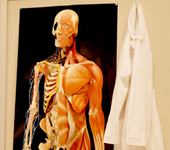Curriculum
The Department of Biological Sciences at Hampton University offers an academic program in which students develop competence in analytical techniques, investigative design, and effective communication appropriate to the discipline of biological sciences. Students acquire the ability to recognize and formulate effective responses to moral and ethical scientific issues and current trends in the biological sciences. Our curriculum promotes the opportunity to develop a collective understanding and appreciation of: Cellular signaling and molecular biology; developmental, organismal and microbial biology; ecology, evolution and population biology; genetic and bioinformatic analyses.
Pre-Med Biology
Cellular and Molecular Biology
Cellular and Molecular Biology Curriculum
Integrative Biology
Integrative Biology Curriculum
The Bachelor of Science (BS) degree in the Biological Sciences generally leads to careers in biological research, medicine, science education and government or science related business or industry. Students attain qualities that prepare them for the successful management of an expansive range of careers. In all courses in our curricula, students are taught logical thought, clarity of expression, experimental design and techniques of analytical investigations.
Please note: Most science-based careers indeed require an advanced degree (M.S., Ph.D.) or technical training. All undergraduates are encouraged to routinely meet with their assigned departmental faculty advisor to discuss and plan for the career that they so choose!
Prior to their junior year, undergraduate Biological Science majors elect to complete a concentration in Pre-Med Biology, Cellular and Molecular Biology or Integrative Biology. Novel activities, courses and course content are continually introduced in each curriculum to ensure transmission of current concepts in the biological sciences.

- Master of Science in Biology (M.S.)
- Master of Science in Medical Science (M.S.)


